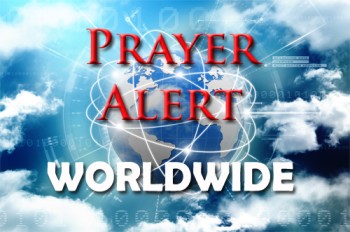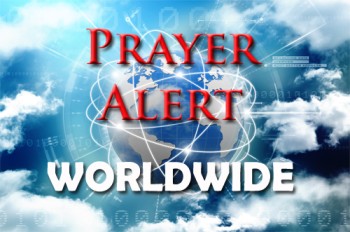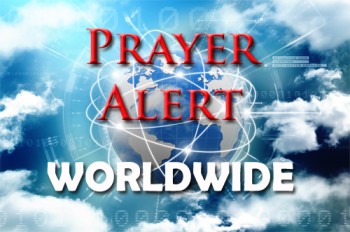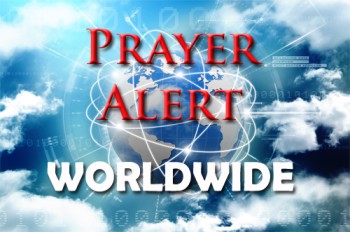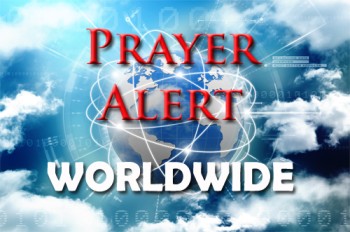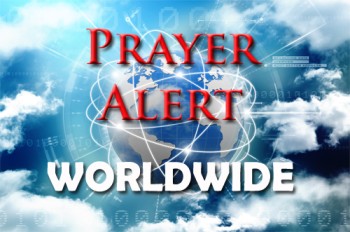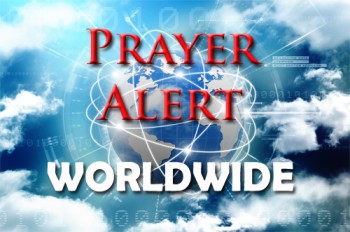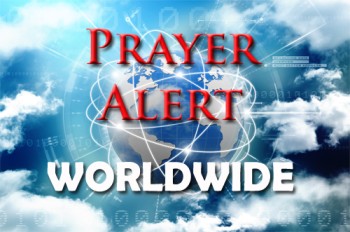Displaying items by tag: Asia
Philippines: angels direct operations for UK missionary
Yorkshire missionary Andy Newlove has shared remarkable stories of God’s faithfulness during fifteen years serving in the Philippines. His life, he says, began with a miracle. After a miscarriage, doctors doubted his mother would carry a child to term, but she prayed and dedicated her son to God. Andy was born, though tragedy followed when his father died while he was still a baby. Growing up, he witnessed many answers to prayer and came to believe that the gifts of the Holy Spirit remain active today. As a child he experienced healing after a severe scald, and later prayed for a girl dying of meningitis who recovered and eventually became his wife, Tracey. When she was 33 weeks pregnant with their first child, they moved 7,000 miles to the Philippines. There they survived earthquakes, typhoons, and dangerous journeys while planting churches and training local believers. Miracles, unity among pastors, and revival marked their years of service. Today their legacy continues through family and Filipino leaders serving Christ worldwide.
China: top carbon emitter becomes renewable energy superpower
While Donald Trump’s administration is pedalling back on American commitment to green energy, China is rapidly expanding renewable energy across its vast landscapes, building huge solar and wind installations to reduce reliance on fossil fuels. In some desert regions, solar panels are not only providing shade but also slowing land degradation, giving farmers renewed hope. The country now produces more solar panels than the rest of the world combined and aims to peak emissions by 2030 and reach carbon neutrality by 2060. Yet the transition brings tensions. Oversupply has hurt manufacturers, while some rural communities lose farmland or feel excluded from decisions. Concerns also remain about labour practices and environmental impacts linked to mining and construction. At the same time, coal still supplies much of the nation’s electricity, meaning the shift must balance economic growth with environmental responsibility. The changes show both promise and hardship as society adapts to a new energy future.
Syria: Alawite women living with fear after targeted violence and kidnapping
In western Syria, families live with fear after reports of kidnappings targeting women from the Alawite minority. Survivors describe being seized by armed men, beaten, threatened, and sometimes assaulted while held in secret locations for days or weeks. Human rights groups have recorded dozens of cases since the overthrow of Bashar al-Assad (an Alawite) in December 2024, but many families say the authorities have failed to investigate properly. Some victims were questioned about their identity and accused because of their background, leaving deep trauma and stigma. Several families fled their homes, afraid of retaliation if they spoke publicly. Even after release, women struggle with nightmares, broken relationships, and isolation. The crisis highlights how instability can expose vulnerable people to exploitation and revenge.
Myanmar: ASEAN leaders divided about how to deal with junta
Regional leaders in Southeast Asia are divided over how to respond to Myanmar’s ruling military junta. After the coup in 2021, ASEAN called for an immediate end to violence, constructive dialogue, the appointment of a special envoy, humanitarian assistance, and a visit by a regional delegation – conditions that the junta has largely ignored. Some governments favour renewed engagement with the ruling authorities, hoping dialogue may reduce conflict. Others insist recognition should wait until violence stops and meaningful participation from all groups is possible. A third group tries to balance principles with diplomacy, maintaining contact while withholding full acceptance. The lack of agreement has stalled regional efforts to bring peace, leaving civilians caught in ongoing instability years after the military takeover. Humanitarian needs continue, refugees cross borders, and uncertainty weakens trust between nations. The situation shows how difficult peacemaking becomes when security, national interests, and justice collide.
Middle East: Trump and Netanyahu meet as Iran talks continue
Rising tensions in the Middle East frame a significant meeting between Donald Trump and Benjamin Netanyahu in Washington. Israel is seeking a comprehensive agreement restricting Iran’s nuclear programme, missile development, and support for regional proxy groups, while Iran has signalled willingness to limit nuclear activity in exchange for sanctions relief but rejects broader demands. The USA has increased military presence in the region, warning of possible strikes if negotiations fail, yet leaders on all sides are continuing the dialogue. Iran’s position has been weakened by the huge recent protests, while Israel fears a deal that leaves long-term threats unresolved. At the same time, the Trump administration is pressing Israel and Hamas to implement the next phase of their ceasefire agreement in Gaza, with accusations of violations and little progress towards reconstruction.
Japan: prime minister’s social media led to her party’s landslide victory
Growing social media interest in prime minister Sanae Takaichi appears to have significantly influenced Japan’s lower house election on 8 February, contributing to a decisive victory for her Liberal Democratic Party. Many voters reported seeing daily clips of her speeches and travel despite chronic illness, creating familiarity and sympathy. Her personal X account gained far more followers than other party leaders, with spikes occurring even during controversy over a missed debate due to medical treatment. Supporters’ viral posts often countered criticism, amplifying positive perceptions. On YouTube, campaign-related videos featuring Takaichi attracted extraordinary engagement, including an advertisement viewed over 150 million times. Independent creators further boosted her visibility, producing most election-related content online. Exit polls showed nearly a quarter of voters relied primarily on social media when deciding how to vote, with strong shifts toward the ruling party among them. Online popularity appears to have translated directly into ballots cast.
Imprisoned Chinese pastor's daughter: ‘repression cannot extinguish faith'
At a recent meeting in Washington, Grace Jin Drexel shared the moving story of her father, Pastor Ezra Jin, imprisoned in China for his Christian faith. He was arrested in October alongside 27 other leaders from Zion Church, in what has been described as one of the largest crackdowns on independent churches since the Cultural Revolution. Grace explained that the arrests are part of China’s aggressive campaign to bring all religious life under Communist Party control. Churches have been forced to remove crosses, replace worship songs with revolutionary anthems, rewrite sermons to align with socialist ideology, and install surveillance cameras inside sanctuaries. Zion Church was targeted after refusing to install facial recognition cameras. Despite closures and intimidation, the church adapted, developing hybrid online and offline gatherings. During the pandemic, this model led to remarkable growth, expanding to over a hundred meeting spaces in forty cities and reaching thousands daily. Grace also spoke of the severe prison conditions facing detained leaders, her family’s separation, and harassment abroad. Yet she testified confidently that God remains faithful, prayers are not in vain, and repression cannot extinguish the Church.
Gaza: humiliation and trauma after Rafah crossing reopens
When the Rafah border crossing was reopened on 2 February, Palestinian women returning to Gaza have described a journey marked by fear, humiliation and deep emotional trauma. Of around fifty people expecting to cross from Egypt on one day, only twelve - three women and nine children - were ultimately allowed through. Several women reported being separated from their children, blindfolded, handcuffed and interrogated for hours by Israeli forces who control entry at the crossing. One woman said she was threatened with detention and pressured psychologically, despite explaining she only wished to return home and see her children. Basic belongings, food and water were confiscated, adding to the exhaustion of an already gruelling journey. Meanwhile, critically ill patients seeking medical treatment abroad were largely denied passage, leaving tens of thousands waiting inside Gaza. There are also reports that Israel is pressurising NGOs working in Gaza: see
Pakistan: more than 175 terrorists killed in Balochistan
A wave of coordinated terrorist attacks struck multiple towns and cities across Balochistan in the early hours of 31 January, targeting security forces and government installations. The assaults, which were carried out by a group which the state has named Fitna-al-Hindustan (to highlight alleged links with India), prompted large-scale security operations across the province. More than 175 militants have been killed, while fifteen security personnel and eighteen civilians lost their lives. Suicide bombers, including women, were among those involved in the attacks. In response to security concerns, mobile internet services were suspended in Quetta and several other districts, disrupting daily life for residents. Balochistan’s chief minister Sarfraz Bugti pledged firm action to restore stability, while federal officials said operations were continuing to eliminate remaining threats. The violence has heightened fear and uncertainty for communities already living with long-standing insecurity.
USA: Trump will cut tariffs if India stops buying Russian oil
Claims of a major shift in global energy politics emerged after Donald Trump announced plans to cut tariffs on Indian exports. Trump said he had agreed a trade deal with Narendra Modi in which India would stop buying Russian oil, a move he argued could help bring an end to the war in Ukraine. India has been one of Russia’s largest customers since 2022, benefiting from discounted prices as Western nations reduced purchases. While Modi welcomed the tariff reductions and spoke positively about peace, he did not publicly confirm any pledge to halt Russian oil imports. India remains heavily dependent on overseas energy and has emphasised diversification rather than abrupt change. It has already started to cut back on buying Russian oil, even though Moscow insists supplies remain uninterrupted. For an insight on India’s shifting relationship with Russia, see

